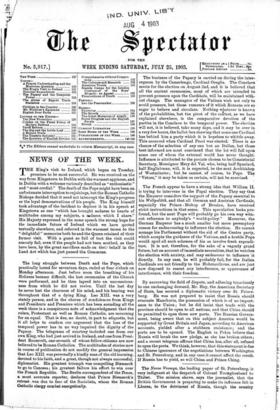The long struggle between Death and the Pope, which practically
lasted for seventeen days, ended at four o'clock on Monday afternoon. Just before noon the breathing of his Holiness became difficult, the last ceremonies of the Church were performed, and he then lapsed into an unconscious- ness from which he did not revive. Until the last day he never lost the clearness of his mind, and his bearing was throughout that of a dying King. Leo XIII. was a very stately person, and in the chorus of condolences from Kings and Presidents and Premiers which has been sounding all the week there is a conspicuous note of acknowledgment that the rulers, Protestant as well as Roman Catholic, are mourning for an equal. That is due, no doubt, in part to etiquette, but it all helps to confirm our argument that the loss of the temporal power has in no way impaired the dignity of the Papacy. The telegrams of courtesy included one from our own King, who had just arrived in Ireland, and one from Presi- dent Roosevelt, one-seventh of whose fellow-citizens are now believed to be Roman Catholics. The multitudes of stories now in course of publication do not modify the general impression that Leo XIII. was personally a kindly man of the old learning, devoted to his faith, and a great, though not always successful, diplomatist. His greatest triumph was compelling Bismarck to go to Canossa; his greatest failure his effort to win over the French Republic. The Berlin correspondent of the Mau, a most accurate reporter, declares that Prince Bismarck's retreat was due to fear of the Socialists, whom the Roman Catholic clergy combat energetically.






































